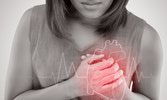In the United States, heart disease is the leading cause of death for both men and women. Although it affects both men and women, symptoms in women may look different than symptoms in men. Because symptoms in women are less commonly known, fewer women are diagnosed with heart disease. It is crucial for women to understand that their symptoms will differ from what men experience and knowing them can help protect you. In this blog, we will share with you the symptoms of heart disease in women.
Heart Disease Symptoms in Women
- Pain or discomfort in the chest
- Discomfort in the neck, jaw, shoulder, upper back, or upper belly
- Shortness of breath
- Pain in one or both arms
- Nausea or vomiting
- Sweating
- Unusual fatigue
- Indigestion or heartburn
Risk Factors of Heart Disease
- Diabetes
- Menopause
- Family history of heart disease
- Mental health conditions like anxiety, depression, and stress
- Smoking
- Inactive lifestyle
- Obesity
- Overuse of alcohol
- High blood pressure
- Use of hormonal birth control
- Inflammatory and autoimmune diseases
What Can You Do?
Although there are many risk factors that can’t be changed like age and family history, there are a few changes that you can make that will hopefully lower your risk of developing heart disease. Here’s what you can do:
- Effectively manage your current health conditions
- If you currently have health conditions like high blood pressure, diabetes, or high cholesterol, it is important that you follow all treatment and management instructions given to you by your doctor. If you are not currently being treated for these conditions, speak with your doctor about treatment options.
- Maintain a healthy weight
- Maintaining a healthy weight by exercising regularly and eating a healthy diet can be very beneficial in preventing heart disease.
- Limit alcohol
- Limiting and avoiding alcohol can help lower your risk of developing high blood pressure and weight gain.
- Quit smoking
- Smoking cigarettes can increase your risk of developing heart disease and heart attack. It is important that if you don’t smoke, you shouldn’t start, and if you do smoke, it is crucial that you quit.
Heart disease is very serious, and it is important to know and understand the signs and symptoms to help you get the help that you need. To learn more about our cardiology services, visit our website!


